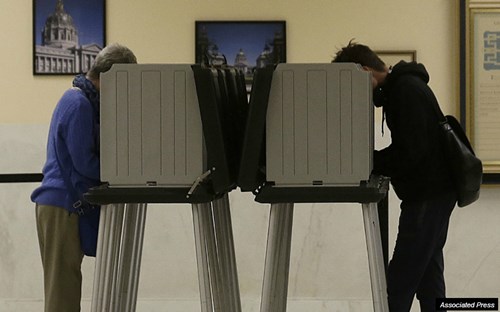With the abortion fight shifting to states and state governments, now 10 states – one-fifth of the country – face abortion measures on their November ballots.
Since the fall of Roe, several states have enshrined a right to abortion in their constitution or advanced abortion protections in some other way. Two of those so far are blue-state Michigan and red-state Ohio, where abortion rights won the day.
Many of these measures have been organized by Planned Parenthood and other pro-abortion groups, according to The Family Research Council.
 The constitutional amendments make protection of life especially difficult.
The constitutional amendments make protection of life especially difficult.
“A state constitution’s going to trump any other provision of state law. Frankly, even if there’s an issue in federal law, depending on what the issue is, state law may trump it, but a state constitution’s going to trump a state law if the point is in the same area,” Travis Weber, FRC’s vice president for policy and government affairs, said on Washington Watch Monday.
States voting in some way on abortion in November include: Arizona, Colorado, Florida, Maryland, Missouri, Montana, Nebraska, Nevada, New York and South Dakota.
The amendments would carry significant legal weight and could only be challenged on very specific grounds, Weber said.
“Then abortion litigation groups would get in there and argue,” he said.
Vague Missouri amendment challenged
One of the most far-reaching proposed amendments is in Missouri, a state which bans abortions except in cases of danger to the mother. Missouri had a “trigger” law that put its restrictions in place once the U.S. Supreme Court overturned Roe v. Wade.
Those abortion protections will be rolled back if voters pass Amendment 3. The reason they may not get the chance is because abortion proponents have angled for so much more than abortion protection in a vaguely worded proposal.
The state supreme court is expected to rule Tuesday, today, on whether the measure will be placed on the ballot after a lower-court judge said the poorly-worded measure violated state ballot requirements.
“The people of the state of Missouri are being sold a bill of goods, and it’s a blatant violation of the law, as the judge identified, to fail to notify the people of the state of all the statutory provisions that this dangerous amendment seeks to overturn,” Missouri Attorney Gen. Andrew Bailey told show host Tony Perkins.

Bailey says the measure leaves too much open for interpretation and in doing so could lead to rollbacks of state laws forbidding gender-manipulation surgeries for minors and for parents’ rights to challenge local school districts on objectionable content in sex education courses.
The amendment language, if passed, would enshrine “the right to make and carry out decisions about all matters related to reproductive healthcare including but not limited to prenatal care, childbirth, post-partem care, birth control, abortion care, miscarriage care and respectful birthing conditions.”
Opponents say “not limited to” could be expanded to include any number of far-left favored projects.
“It is absolutely wide open, and it’s dangerous. It’s a lie,” Perkins said.
Currently, the Missouri General Assembly has set guidelines for sex-ed material. Even so, parents have the right to opt-out for the children.
“This would undo that and would eliminate a parent’s right to object to sexually explicit content or other education in the public school system, which might not be consistent with the parent’s values or consistent with objective reality for that matter,” Bailey warned.
Gender surgery future on the ballot, too
Amendment 3 would also overturn Missouri Senate Bill 49, passed in May of 2023, which bans gender-manipulation procedures for minors.
“The growth of this industry was exponential. The harms the children were suffering were severe," Bailey said. "A whistleblower came forward which prompted my investigation which resulted in legislative action. Senate Bill 49 was passed, and we successfully defended it at the trial court level against constitutional attack."
Amendment 3 would “return us to a world where children could go to these mutilation clinics and forever change their bodies without parental consent, without fully understanding the danger of undergoing these kinds of procedures,” the attorney general also warned.














